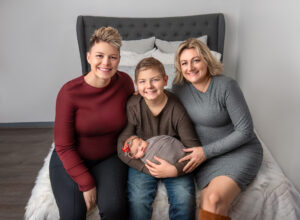
Birds do it, bees do it
Even educated fleas do it
Let’s do it, let’s fall in love.– From Cole Porter’s “Let’s Do It (Let’s Fall in Love)”
Fine for the birds and the bees and even the educated fleas, but when it comes to homo sapiens, the course of love, union and especially having offspring is as fraught as ever. According to the Centers for Disease Control and Prevention (CDC), one in five couples in the United States struggles with some form of infertility, with $7.9 billion spent on fertility services in 2022 https://finance.yahoo.com/news/u-fertility-clinics-market-2028-094800081.html – a figure that is expected to grow at a compounded annual rate of 13.6% to reach $16.8 billion by the end of 2028. As those numbers suggest, fertility treatments are not cheap, beginning anywhere from $12,000 to $14,000 for one IVF (in vitro fertilization) cycle, said Forbes. And you’ll need two to three cycles. (For how IVF works, see story by Alexander Kucherov, M.D., of Illume Fertility on Page 13.) These cycles are generally covered in New York state and Connecticut, although a gay couple has brought a class-action lawsuit against New York City, charging it with discrimination. as its IVF coverage only applies to women and heterosexual couples.
For some seeking to get pregnant, cost is not the only worry. In February, the Alabama Supreme Court ruled that the frozen embryos used in IVF were people, and that those who destroy them could be liable for wrongful death. When three of the state’s limited pool of IVF providers halted services, sending treatment seekers out of state, the majority Republican state Legislature created a new law, signed by Gov. Kay Ivey, that would provide civil and criminal immunity to providers and patients who destroyed or damaged embryos. Nonetheless, observers have called the new measure, which did not address the subject of embryos’ personhood, the latest front in the states’ war over reproductive rights.
For Brooke Goff, the legal, financial and psychological hurdles in obtaining fertility treatments are personal. The founder and president of Goff Law Group in West Hartford – and an openly gay woman who became a parent through in vitro fertilization and artificial insemination — has pledged $430,000 to offset the cost of any fertility treatments for her staff of 12 female attorneys.
“I knew at a young age that I wanted to have a family, yet I also knew that as a gay woman, I would need some assistance from science,” said Goff, whose firm is the largest women-owned and -operated personal injury law firm in Connecticut. “In vitro fertilization fulfilled my desire to carry a child and experience the beautiful journey of pregnancy, something every woman should be entitled to if she so desires, regardless of her sexuality.”
To that end, Goff began researching viable solutions in 2022 but learned that only larger global companies, not small businesses, would even consider fertility health coverage.
“I was taken aback that more small businesses do not invest in their employees across the board with family planning and creation,” she added. “Employees are the lifeblood of any company and if a business owner wants continued success and profitability, he or she should be investing in their employees’ family – both present and future.”
Ultimately, Goff partnered with Carrot, a third-party health benefit company, and absorbed the entire cost of implementing the program. Specifics of Goff Law Group’s comprehensive IVF program include:
- mental health counseling as related to the infertility process;
- individual infertility journey design and implementation;
- access to more than 800 clinics throughout the United States;
- discount coverage for infertility care, including but not limited to IVF, IUI (intrauterine insemination, also known as artificial insemination), surrogacy, adoption, preservation of embryos, genetic testing and medications related to infertility; and
- coverage for after-birth lactation services, overnight doulas and women’s behavioral health as related to postpartum experiences.
“It has always been my belief that every woman deserves the right to have a family and, unfortunately, it is easier for some than others,” said Goff. “When infertility comes into the mix, it adds unplanned costs to the family and a lot of anxiety and uncertainty. Hence, it is important to offer a benefit with full-spectrum physical and mental health care.”
Although some health insurance plans cover run-of-the-mill infertility treatments, they may have certain requirements as a result of strict state mandates, such as 12 months of unsuccessful attempts to become pregnant and other limitations based on the age of the woman, she added. Also, health insurance may not cover surrogacy, adoption, egg harvesting, donor eggs or donor sperm. “I wanted to provide something better to my employees’ alternative to the minimal health insurance coverages currently on the market.”
When asked if she has any concerns about her female employees becoming mothers and its residual effect on her firm’s bottom line due to them being out of the office for sick days, Goff said that she prefers hiring working mothers because they do the same amount of work in eight hours that others often do in 12, since they have learned excellent time management and organization skills, patience and compassion while raising a family — all essential traits in operating a legal business.
“Everyone has their own parenting journey and I want to open all of the doors for my employees to select one that universally meets their medical history, sexual preference and financial situation,” she said. “Doing my part to give my employees hope and direction in creating a family is something I take very seriously – and so should everyone else.”
 When surrogacy is a sister act
When surrogacy is a sister act
For some, surrogacy – legal in all states except Nebraska and Louisiana – is the answer to infertility, though costs and fees range from $85,000 to $130,000. (Connecticut and New York are two of only six states that mandate insurance coverage for surrogacy, the others being New Jersey, Maryland, Illinois and California.)
Surrogacy can also be an emotional and legal minefield when one of the parties breaks the contract, as in the infamous 1988 “Baby M” case.
Oftentimes, though, surrogacy has a much smoother outcome. For Jaclyn Fieberg, an elementary school teacher from Katonah, the path to motherhood lay in surrogacy – and sisterhood.
Fieberg used a combination of fertility options working with RMA of New York–Westchester – which has offices in White Plains, Mount Kisco and Poughkeepsie – after seven IVF failures and three miscarriages due to a chromosomal disorder, mosaic Turner syndrome. She also drew on extraordinary support from two of her sisters. Sister Meredith McIntyre donated her eggs, while sister Stephanie Corritori carried the baby girl, Emersyn Fieberg, to term. (The youngest of the sisters, Samantha Prato, who is single, cheered them on.)
As Corritori told People: “We have always been there for each other.”
Fieberg, whose story appeared in People and on the “Today” show, spoke about her experience at an RMA panel Thursday, May 9, at Sunningdale Country Club in Scarsdale, along with Matthew Lederman, practice director of RMA of New York at CareMount in White Plains; Georgia Witkin, M.D., director of wellness services at RMA of New York; and Alexis Cirel, fertility and family law partner at Warshaw Burstein LLP in Manhattan.
But it’s not just Fieberg’s story. Ultimately, it’s her daughter’s:
“She’s going to know her story,” Fieberg told “Today,” “and she’s going to know how wanted she was, and that her aunts did the most selfless, incredible thing.”
For more, visit https://www.rmany.com/about-rmany/locations/westchester.























